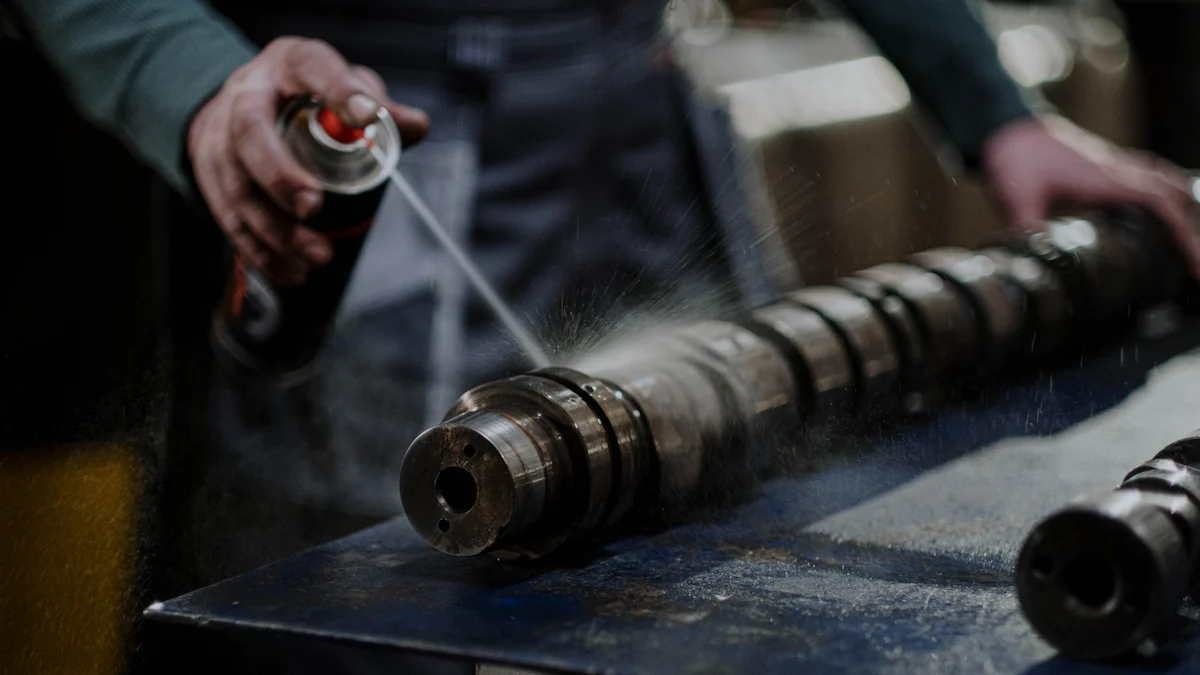
An automatic lighter making machine produce line is a system designed to manufacture lighters efficiently. It automates the entire process, from assembling components to packaging the final product. You can rely on this system to streamline production, reduce manual labor, and maintain consistent quality. This innovation ensures faster output and improved precision in every lighter produced.
Key Takeaways
- Automatic lighter machines work fast, making thousands of lighters quickly.
- Quality checks make sure only good lighters go to customers. This helps build trust and keeps the brand strong.
- Buying an automatic lighter machine lowers worker costs and saves money. It is a smart choice for businesses.
How the Produce Line Works

Step-by-step process from raw materials to finished lighters
The produce line begins with raw materials like plastic, metal, and flint. These materials enter the system through designated input points. The first step involves molding the plastic into lighter casings. Machines then cut and shape the metal components, such as the fuel tank and ignition parts. Afterward, the system assembles these pieces into a functional lighter. Finally, the produce line fills the lighters with fuel and seals them for safety.
Once the assembly is complete, the lighters move to the testing phase. Here, machines ignite each lighter to ensure proper functionality. Any defective units are removed from the line. The final step involves packaging the lighters into boxes, ready for distribution.
Automation and integration of processes
Automation plays a crucial role in the produce line. Each stage, from molding to packaging, operates seamlessly through interconnected machines. Sensors and robotic arms handle tasks with precision, reducing the chance of errors. The integration of processes ensures that the system runs continuously without interruptions. This setup allows you to produce large quantities of lighters in a short time.
Role of quality control in ensuring product standards
Quality control is essential in maintaining high standards. Automated systems inspect each lighter for defects during production. These systems check for issues like improper assembly, fuel leakage, or ignition failure. By identifying problems early, the produce line ensures that only reliable products reach the market. This focus on quality helps you build trust with your customers.
Key Components of the Produce Line
Assembly units and their functions
The assembly units form the backbone of the produce line. These units handle the precise construction of each lighter. The plastic molding unit shapes the lighter casings, ensuring uniformity in size and design. The metalworking unit processes components like the fuel tank and ignition mechanism. Robotic arms then assemble these parts with remarkable accuracy. Each unit performs its task in a synchronized manner, ensuring a smooth flow of production. You can rely on these units to maintain speed and precision throughout the process.
Quality control systems for maintaining consistency
Quality control systems play a vital role in the produce line. These systems use advanced sensors and cameras to inspect every lighter. They detect issues such as misaligned parts, fuel leaks, or faulty ignition. Any defective lighter is automatically removed from the line. This ensures that only high-quality products reach your customers. By integrating these systems, you can maintain consistency and uphold your brand’s reputation.
Packaging modules for final product preparation
The packaging modules prepare the finished lighters for distribution. These modules group the lighters into sets and place them in boxes. Automated arms seal the boxes securely, readying them for shipment. The packaging process operates at high speed, matching the pace of production. With these modules, you can ensure that your products are neatly packed and protected during transit.
Benefits of the Produce Line
Increased efficiency and productivity
The produce line significantly boosts your production speed. Automated systems handle tasks like assembly, testing, and packaging without delays. Machines work continuously, ensuring that every stage of production flows smoothly. You can produce thousands of lighters in a fraction of the time it would take with manual labor. This efficiency allows you to meet high demand and scale your operations with ease. Faster production also means you can deliver products to your customers more quickly, improving satisfaction.
Cost-effectiveness and reduced labor dependency
Automation reduces your reliance on manual labor. Machines take over repetitive tasks, which lowers labor costs. You can allocate your workforce to more strategic roles, such as supervision or maintenance. Additionally, automated systems minimize errors, saving you money on rework or defective products. Over time, the initial investment in the produce line pays off through reduced operational costs. This cost-effectiveness makes it an ideal solution for businesses aiming to maximize profits.
Consistency and precision in production
Automated systems ensure that every lighter meets the same high standards. Machines perform tasks with precision, eliminating variations in size, shape, or functionality. Sensors and quality control units inspect each product, ensuring consistency across batches. This reliability builds trust with your customers, as they know they can expect the same quality every time. By maintaining precision, you strengthen your brand reputation and stand out in a competitive market.
Applications of the Produce Line
Industries that commonly use these machines
The automatic lighter making machine has become a vital tool in several industries. The manufacturing sector relies heavily on these machines to meet the growing demand for lighters. Companies producing disposable lighters use the produce line to maintain high output levels. This ensures they can supply products to retailers without delays.
The hospitality industry also benefits from these machines. Hotels, restaurants, and bars often require lighters for their daily operations. Suppliers catering to this sector depend on automated systems to produce lighters in bulk. Additionally, the camping and outdoor gear industry uses these machines to create durable lighters for adventurers.
Businesses benefiting from automated lighter production
Small and large businesses alike gain from automated lighter production. For startups, these machines provide a cost-effective way to enter the market. You can produce high-quality lighters without hiring a large workforce. Established companies use these systems to scale their operations. Automation allows them to handle larger orders and expand their market reach.
Retailers also benefit indirectly. Consistent production ensures a steady supply of lighters for their shelves. This reliability helps them meet customer needs and avoid stock shortages. By investing in automation, businesses can improve efficiency and stay competitive in the market.
Considerations for Implementing the Produce Line
Factors to evaluate when choosing a machine
When selecting a machine for your produce line, you need to assess several factors. Start by evaluating the production capacity. Ensure the machine can meet your daily output requirements without overloading. Next, check the compatibility of the machine with the materials you plan to use. Some machines work better with specific plastics or metals.
You should also consider the machine’s energy consumption. Machines with high efficiency can reduce your operational costs. Additionally, look for user-friendly controls. A machine with an intuitive interface will simplify training and operation. Finally, research the manufacturer’s reputation. Reliable brands often provide better customer support and durable equipment.
Maintenance and operational requirements
Proper maintenance ensures your machine operates smoothly. You should create a regular maintenance schedule to inspect and clean the equipment. Replace worn-out parts promptly to avoid breakdowns. Keep a stock of essential spare parts to minimize downtime during repairs.
Train your staff to handle basic troubleshooting. This will help you resolve minor issues quickly. Also, monitor the machine’s performance regularly. Use data from sensors or logs to identify potential problems early. By maintaining your machine, you can extend its lifespan and ensure consistent production.
Scalability and customization options
Scalability is crucial if you plan to expand your operations. Choose a machine that allows you to increase production capacity easily. Modular designs are ideal, as they let you add or upgrade components as needed. Customization options are equally important. Look for machines that can adapt to different lighter designs or packaging styles.
You should also consider software upgrades. Machines with upgradable software can stay compatible with new technologies. This flexibility ensures your produce line remains efficient as your business grows. Investing in scalable and customizable equipment prepares you for future challenges.
The automatic lighter making machine produce line simplifies lighter production. It automates assembly, quality control, and packaging, ensuring efficiency and precision. By investing in this system, you can reduce costs, increase productivity, and maintain consistent quality. This solution is ideal for businesses aiming to streamline operations and meet growing market demands.
FAQ
What is the average production capacity of an automatic lighter making machine?
The production capacity varies by model. Most machines can produce between 5,000 and 10,000 lighters per hour. Check the specifications for exact details.
How much maintenance does the machine require?
Regular maintenance includes cleaning, part replacement, and performance checks. Schedule inspections monthly to ensure smooth operation and prevent unexpected breakdowns.
Can the machine handle custom lighter designs?
Yes, many machines offer customization options. You can adjust settings or upgrade components to accommodate unique designs or packaging requirements. Always confirm compatibility before purchase.
💡 Tip: Consult the manufacturer for specific customization capabilities and support options.


